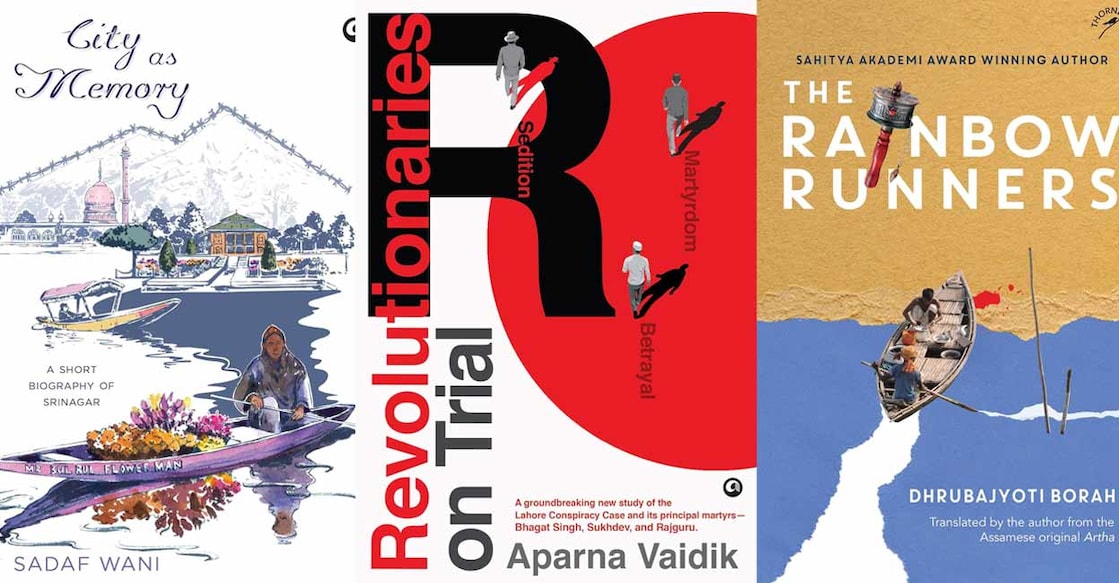Weekend Reads: Indulge in literature on personal and historical accounts

Mail This Article
New Delhi: From the engrossing trial of Bhagat Singh, Sukhdev, and Rajguru to a walk through 'Sirinagar', and then a journey from trauma to liberation, here is a recommendation before you retreat to your book nook this week:
'City as Memory' by Sadaf Wani
A valley of many wonders, Kashmir seldom ceases to attract, for one reason or another. And ‘Sirinagar’ (not Srinagar), the ancient city that bears in its bosom histories of centuries, has one in the recent past of lulls and storms—the aftermath of which remains lingering.
Sadaf Wani grew up through the 1990s when Kashmir was gripped in the inclement clutches of insurgency, and her adolescent years through the 2000s had recurring tumultuous phases with bouts of violence and civilian protests—intertwined intricately with memories of growing up and growing through a turmoil-ridden homeland.
Growing up in Varmul—most of the time spent indoors, and occasional travels to Srinagar or Sopor had Sadaf feel an overwhelming sense of freedom. Eventually, she equated life with safety which is good, and untimely death as a loss which is bad.
As she writes, the professional association with Srinagar has allowed her the flexibility to change her lens towards the city, and every time her research questions changed, "Srinagar has revealed its entirely different sides in response."
This book is a first-hand insider account of the dynamics of Srinagar city, especially with regard to Downtown, the mezzanine part of the ancient city which established itself as the nucleus of the resistance movement in the 90s. The author is a writer and communications professional.
'Revolutionaries on Trial: Sedition, Betrayal, and Martyrdom' by Aparna Vaidik
Studying afresh the Lahore Conspiracy Case and its celebrated martyrs—the “self-proclaimed revolutionaries”—Bhagat Singh, Sukhdev, and Rajguru, Revolutionaries on Trial expands the scope of the historical enquiry by scrutinising the colonial state, the revolutionaries, and the Indian press (and public) in the roles of the plaintiff, the defendants, the spectators respectively, along with the witnesses for the prosecution.
While the book reconstructs the history, it throws up questions like why were the revolutionaries even tried at all? What was the strategy of this trial besides propaganda? Can establishing the history of nationalism be a ‘collaboration’?
This book is a vivid account of the people involved and of the events of a trial that marks the early chapters of India’s struggle for Independence.
The author is a professor of History at Ashoka University.
'The Rainbow Runners' by Dhrubajyoti Borah
Accompanying the above-mentioned non-fiction titles is Dhrubajyoti Borah’s The Rainbow Runners: the tale of young Simran whose life flips one day as he lives in insurgency-hit Assam.
Left paranoid and reticent after being consumed by raw terror, Simran finds himself wafting into the foggy realm of journalism, and then to the former leaders who surrendered to the state and now work for it. Yet, there is another episode that moves the ground beneath his feet.
Seeking new ways to find himself, his discovery of Tathagata Buddha leads him to learn about the tragic reality of the Tibetan refugees and their unwavering aspiration to restore their homeland. Simran’s story will resonate with anyone who seeks to find new meaning and hope in life.
Recipient of Sahitya Akademi award, Dhrubajyoti Borah is an illustrious voice in contemporary Assamese literature, who writes in both Assamese and English. He has published more than 25 novels.
(With inputs from IANS)

